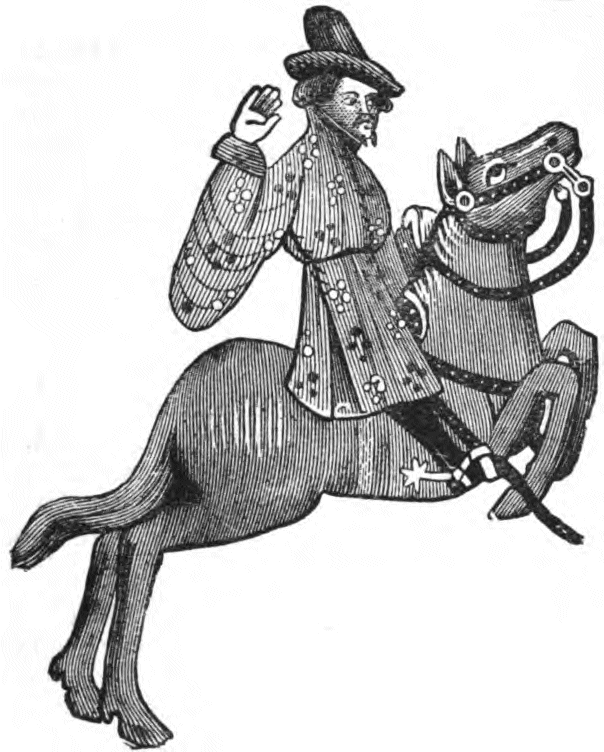

THE MERCHANT
The Ellesmere picture of the Merchant shows him in his 'motteleye' dress of red, lined with blue, and embroidered with blue and white flowers,—perhaps rather a gayer dress, and with more fashionable boots than Chaucer intended. From the mention of Middelburgh (see quotation from Prof. Hales in note to 1. 277) it is probable that he was a Merchant of the Staple, and engaged not merely in inland but in foreign trade. The Staple was a government organization, dating probably from the reign of Edward I., which fixed the town or towns in which the 'staple' products of England, such as wool, hides, and tin, might be sold to foreigners, so as to facilitate the collection of customs. When Chaucer was writing, the foreign staple was at Middelburgh, and the Merchant would have to transport his goods thither, and desired that the sea should be well guarded that they might go in safety. Until the reign of Edward III. the most important merchants in England were foreigners, but in his reign there were many English merchants of great wealth.
Chaucer's would not have ranked with these. He was in debt, we are told, and he seems to have made his profits (see note to 1. 278) by questionable means.
275. Sownynge alway thencrees of his wynnyng. 'Sownynge,' sounding, tending to. The Merchant gave his ‘resons' or opinions, on English policy, and these were always affected by his idea as to what would be good for trade and so conduce to the increase of his own profits. His talk was thus the opposite of the Clerk's whose speech was 'sownynge in moral vertu" (1. 307).
276. He wolde the see were kept for any thing. He desired that no matter what might happen ('for anything') the sea should be guarded. This keeping of the sea was the king's duty, 'the old subsidy of tonnage and poundage,' as Tyrwhitt notes, being granted him for this purpose. But the royal ships did not always suffice, for in 1378 a Scotch pirate did such harm to English commerce that one of the rich London merchants, John Philipot, hired ships at his own expense and cleared the sea.
277. Bitwise Middelburgh and Orewelle. Middleburgh is in the isle of Walcheren, nearly opposite the mouth of the Orwell on the Dutch coast. Prof. J. W. Hales, in his Folia Litteraria (Seeley, 1893, p. 100) writes: '‘We are told of the Merchant that he thought it of prime moment that the passage from Harwich to Middelburgh should be swept clear of pirates. Why Middelburgh? The answer to this query proves that the Prologue must have been written not before 1384 and not later than 1388. In 1384 the wool staple was removed from Calais and established at Middelburgh ; in 1388 it was fixed once more at Calais (see Craik's History of British Commerce, i. 123). The said wool staple led a somewhat nomad life in the fourteenth century: it was at different times established at Bruges and Antwerp, not to mention various towns in England, but its only sojourn at Middelburgh was that in the years 1384-8; and so only just at that time could the Merchant's words have their full significance."
278. Wei koude he in eschaunge sheeldes selle: Prof. Flügel notes that by selling at a profit the French crowns (called 'sheeldes,' from having a shield on one side of them) which he received for his goods the Merchant was breaking a statute of Edward III. which forbade anyone to make a profit on exchange, except the royal money changers (25 Edward III., Stat. 5. c. 12). Nowadays the rate of exchange between coins of different countries varies primarily with the balance of trade, but in Chaucer's time there were other variations due to the constant tampering with the coinage, and these variations would offer increased chances of profit. The real insinuation, however, appears to be that under colour of’exchange' the Merchant made bargains which involved usury. Flügel quotes from an Ordinance against Usurers of 38 Edward III. (Liber Albus, ed. Riley, p. 319): "certain persons who ... maintain the false and abominable contract of usury, under cover and colour of good and lawful trading ; which kind of contract, the more subtly to deceive the people, they call ‘exchange' or ‘chevisance'" (cf. 1. 282).
284. I noot how men hym calle. Chaucer's parade of his ignorance of the Merchant's name is supposed to suggest something of a courtier's contempt for ‘city-people.' We may find another reason for his not giving a name in the suspicions he casts on the Merchant's dealings.
--o--
These notes are reproduced verbatim from Alfred W. Pollard, Chaucer's Canterbury Tales: The Prologue, London: Macmillan, 1903. The book is in the public domain and available for viewing and download from Google Books. Although the book is old, the notes are generally enlightening and accurate. Nevertheless, users doing detailed research on aspects of the General Prologue should, if possible, also consult more recent notes in print publications such as The Riverside Chaucer, ed. Larry D. Benson, 3rd ed., Boston: Houghton Mifflin, 1987.